- Home
- Ron Chernow
Titan Page 3
Titan Read online
Page 3
Since he usually presented false claims about himself and his products, Bill worked a large territory to elude the law. He was roving more than thirty miles northwest of Richford, in the vicinity of Niles and Moravia, when he first met his future wife, Eliza Davison, at her father’s farmhouse. With a flair for showmanship and self-promotion, he always wore brocaded vests or other brightly colored duds that must have dazzled a sheltered farm girl like Eliza. Like many itinerant vendors in rural places, he was a smooth-talking purveyor of dreams along with tawdry trinkets, and Eliza responded to this romantic wanderer. She was sufficiently taken in by his deaf-and-dumb humbug that she involuntarily exclaimed in his presence, “I’d marry that man if he were not deaf and dumb.”8 Whatever tacit doubts she might have harbored when she discovered his deceit, she soon succumbed, as did other women, to his mesmerizing charm.
A prudent, straitlaced Baptist of Scotch-Irish descent, deeply attached to his daughter, John Davison must have sensed the world of trouble that awaited Eliza if she got mixed up with Big Bill Rockefeller, and he strongly discouraged the match. In later years, Eliza Rockefeller would seem to be a dried-up, withered spinster, but in late 1836 she was a slim, spirited young woman with flaming red hair and blue eyes. Pious and self-contained, she was the antithesis of Bill and probably found him so hypnotic for just that reason. Who knows what gloom hung around her doorstep that was dispelled by Bill’s glib patter? Her mother had died when Eliza was only twelve—she had dropped dead after taking a pill dispensed by a traveling doctor—and Eliza was raised by her older sister, Mary Ann, leaving Eliza deprived of maternal counsel.
On February 18, 1837, despite the express opposition of John Davison, this most improbable couple—Bill was twenty-seven, Eliza twenty-four—were wed at the home of one of Eliza’s friends. The marriage was a favorite gossip item among the Richford townspeople, who tended to spy guile on Bill’s part. Compared to the Davisons, the Rockefellers were poor country folk, and it is very likely that Bill was entranced by reports of John Davison’s modest wealth. As early as 1801, the frugal Davison had acquired 150 acres in Cayuga County. In John D.’s words, “My grandfather was a rich man—that is, for his time he was counted rich. In those days one who had his farm paid for and had a little money beside was counted rich. Four or five or six thousand was counted rich. My grandfather had perhaps three or four times that. He had money to lend.”9
Most Richford residents believed that Big Bill’s meeting with Eliza was less a random encounter than a premeditated bid to snare her father’s money. A notorious cad who regarded every pretty young woman as a potential conquest, Bill had at least one serious romance that antedated his wooing of Eliza. As Ralph P. Smith, a longtime Richford resident, recalled, “Billy was unmarried when he came here, and it was supposed that he would marry Nancy Brown, who was his housekeeper, but he broke with her, settling a sum said to have been about $400 on her when he concluded to win the daughter of the rich John Davison, over at Niles, on the outskirts of Moravia.” 10 The story is corroborated by John D.’s cousin, Mrs. John Wilcox, who said, “Nancy Brown, of Harford Mills, was a beautiful girl, remarkably beautiful. William fell in love with her. She was poor. William would have money. Eliza Davison’s father was to give her $500 when she married; so William married her.”11
This marriage, consummated under false pretenses, fused the lives of two highly dissimilar personalities, setting the stage for all the future heartache, marital discord, and chronic instability that would so powerfully mold the contradictory personality of John D. Rockefeller.
When Bill brought his bride back to the Richford house he’d built half a mile from his parents’ place, Eliza must have pondered the wisdom of her father’s disapproval: Life promised to be hard and flinty in this rough-hewn homestead. Surviving photos of John D. Rockefeller’s birthplace show a plain clapboard house set on a treeless slope, outlined bleakly against the sky. The rude dwelling looked like two attached boxcars, the austere simplicity broken only by a small awning over one door. However primitive the exterior, the snug house was solidly built out of timber from local forests. The main floor had two bedrooms and a living room, topped by a low sleeping loft and attic storage room; the little attached building served as a barn and woodshed. (This bucolic birth site of the future kerosene king was probably lit by sperm oil or tallow candles.) The grounds were much more ample than the house, as the fifty-acre lot included an apple orchard and a trout-filled stretch of Owego Creek, which bubbled along the bottom of the property.
Before long, Big Bill roughly disabused Eliza of any high-flown romantic notions she might have had about matrimony. Far from renouncing his girlfriend, Nancy Brown, he brought her into the cramped house as a “housekeeper” and began having children, alternately, by wife and mistress. In 1838, Eliza gave birth to their first child, Lucy, followed a few months later by Nancy’s first illegitimate daughter, Clorinda. On the night of July 8, 1839, Bill and Eliza again summoned the midwife, this time to deliver a boy, who came into the world in a bare front bedroom measuring eight by ten feet. This child, born during Martin Van Buren’s presidency and destined to become the country’s foremost capitalist, would survive into the second term of Franklin D. Roosevelt’s New Deal. Like many other future magnates—Andrew Carnegie (born in 1835), Jay Gould (1836), and J. Pierpont Morgan (1837)—he was born in the late 1830s and would therefore come to maturity on the eve of the post–Civil War industrial boom. Several months after John’s birth, Nancy Brown gave birth to a second daughter, Cornelia, which meant that Bill, lord of his own harem, managed to sire four children under one roof in just two years. Thus, the fiercely moralistic John Davison Rockefeller (appropriately named after Eliza’s sober father) was sandwiched tightly between two illegitimate sisters, born into a situation steeped in sin.
Eliza couldn’t have felt very comfortable with her in-laws. In general, the Rockefellers were a hard-drinking hillbilly clan, sociable and funny, fond of music, liquor, and uproarious good times, and adhering to a coarse frontier morality. As the strong matriarch, Lucy was the conspicuous exception, and Eliza drew close to her while frowning upon many of her more dissipated in-laws. During the Richford period, Bill’s younger brother, Miles Avery Rockefeller, deserted his wife and decamped to South Dakota with Ella Brussee, a young woman who had done domestic work for Eliza. In a move that prefigured a future stratagem for Bill, Miles entered into a bigamous marriage with Ella and adopted his middle name as his new surname. Such re-created lives were common at a time when America had a vast, unmapped frontier and numerous sanctuaries from the law.
For a callow farm girl fresh from home, Eliza proved unexpectedly tolerant of Nancy Brown. Contrary to what one might expect, she pitied this intruder, perhaps considering the cramped ménage à trois fit punishment for having flouted her father’s advice. As her niece observed, “Aunt Eliza loved her husband and she liked poor Nancy. But Aunt Eliza’s brothers came down and made William put Nancy away.”12 In this period of Eliza’s marriage, Mr. Davison is conspicuous by his absence, leaving one to wonder whether he had temporarily washed his hands of his disobedient daughter or whether, cowed by guilt and embarrassment, she had hidden her troubles from him. By one account, when Nancy grew quarrelsome after Bill’s marriage, he seized the chance to expel his shrewish mistress from the packed household. Heeding the pleas from the Davisons, he posted Nancy and the two daughters to live with her parents in nearby Harford Mills. Family legend claims that Bill, who had a weak but not entirely dormant conscience, secretly deposited clothing bundles on her doorstep. Fortunately, the years with Bill didn’t blight Nancy’s life, for she married a man named Burlingame, bore other children, and furnished her first two daughters with a respectable upbringing.13 From the skimpy documentary evidence, we know that Clorinda died young while Cornelia grew up into a tall, smart, attractive schoolteacher with a telling resemblance to Big Bill. Sometimes he acceded to her demands for money, but there were strict limits to Bill’s generosity, and he
would rebuff her when she became too clamorous. Cornelia married a man named Sexton and remained in the Richford area, but only a few local residents and Rockefeller relatives knew that she was John D.’s half-sister.14 To her credit, Cornelia never tried to cash in on her kinship with the world’s richest man, perhaps because it would unavoidably have advertised her illegitimacy. It is impossible to determine whether Rockefeller ever knew of the existence of his two illegitimate half-sisters.
The Nancy Brown affair wasn’t the only indignity visited upon Eliza, for she was often abandoned by Bill during her three cheerless years in Richford. He remained a restless and defiant individualist who preferred life beyond the pale of society. Early in the marriage, he stayed put for a while, operating a small sawmill on Michigan Hill and dealing in salt, fur, horses, and timber, but he soon resumed the footloose life of a peddler, his trips cloaked in unfathomable mystery. Like a fugitive, he would depart furtively under cover of night and return after dark, weeks or months later, flinging pebbles at the window to signal his return. To tide over his family in his absence, he arranged for credit at the general store. “Give my family anything they want while I’m away,” he instructed Chauncey Rich, whose father, Ezekiel, had founded Richford, “and when I come back I’ll settle.” 15 Never knowing when this credit might be canceled, Eliza became extremely frugal and drilled her children in thrifty maxims such as “Willful waste makes woeful want.”
When Bill returned home, a sudden, smiling apparition, he would be riding new horses, wearing fine clothes, and brandishing a thick wad of crisp bills. Before going to see Eliza, he would pay off Chauncey Rich so that he could confidently tell her everything was now squared away at the store. His seductive charm melted away whatever hostility his absence had aroused; it took time before his extended absences and repeated betrayals burned the romance out of her system, leaving a residue of stoic resignation. For the moment, whatever her anxieties or loneliness, she seemed girlishly lovelorn during his trips, still smitten with her flimflam man. “Just look at that moon!” she once sighed to a cousin when Bill was on the road. “Is William, miles and miles away, perhaps looking at it, too, at this moment? I do hope he is.”16
On the road, Bill improvised ever more fanciful ways to make money. A crack shot, he made the circuit of shooting contests, often bringing home prize money. A glad-handing huckster, he sold rings and other knickknacks at fantastic markups. Mostly, though, he styled himself a “botanic physician” or “herbal doctor”—euphemisms faithfully parroted by some Rockefeller descendants. At a time when physicians still resorted to bleeding, blistering, and violent purgatives, and many rustic areas lacked access to medical care, such traveling salesmen filled a vacuum. Nevertheless, in William Avery Rockefeller one clearly detects the blarney and easy conviviality of the mountebank. Sometimes he peddled bottles of home-brewed elixir or patent medicines bought from druggists, but he scored his greatest success with natural medicines culled from Lucy’s physic bush. Though his mother had a sincere interest in herbal remedies, Bill would grossly distort or exaggerate their properties. For instance, he harvested small, purplish berries from her garden that resembled small pills and would hawk them to farmers’ wives as a sovereign remedy for stomach troubles. His sales pitch went even further, for, as a Richford neighbor reported many years later, “he would warn them solemnly that they must not be given to a woman in a delicate condition, for they would surely cause abortion. Thereupon he would sell his pills at a high price. They were perfectly harmless, and he broke no law in selling them. He had remarkable imagination.” 17
The midnight rambles and peculiar commerce of William Rockefeller mystified the Richford citizenry. He both fired and troubled the imagination, generating so much gossip and speculation that they christened him Devil Bill. Rumors raced periodically through town that he was a gambler, a horse thief, a desperado. Though he seemed to operate on the edge of the law, people were delighted by his bluff humor and tall tales, if dismayed by his treatment of his family. “When he finally succeeded as a peddler he would dress up like a prince and kept everyone wondering,” said one town resident who participated in the guessing game about Bill’s manifold sources of income. “He laughed a great deal and enjoyed the speculation he caused. He was not a drinking man and treated his family well when he was home, but everyone knew that he neglected the family by leaving them to shift for themselves for long months at a time.”18 He frustrated those neighbors who ached for his comeuppance. After one prolonged absence of several months, when Eliza’s bill at Chauncey Rich’s topped a thousand dollars, the scuttlebutt said that Devil Bill had been arrested. Instead, like a country squire, he came trotting into town in a magnificent carriage, seated behind a team of splendid horses, diamonds glittering in his shirtfront. At the general store, he made a point of settling the tab with large bills. After such trips, Bill gathered friends and family around the dinner table and, while wolfing down heaps of food, would regale them with picaresque tales of his adventures among the western settlers and Indians. Devil Bill had a knack for weaving his experiences into spellbinding narratives, making Eliza and the children vicarious partners in his travels. As the chief casualty of Bill’s peregrinations, Eliza received sympathy from her neighbors, who felt she was being abused by her husband. Yet she remained loyal to him, declined many opportunities to denigrate him, and carried herself with considerable dignity. 19
However overblown the frequent biographical claims about John D. Rockefeller’s impoverished childhood have been, several people testified to the family’s squalor in Richford. “I do not remember ever to have seen more pitiably neglected children,” one neighbor observed. “Their clothing was old and tattered, and they looked dirty and hungry.” 20 It was a measure of Eliza’s desperation that she sought relief in the home of her brother-in-law, Jacob Rockefeller, a bawdy, jolly, not infrequently besotted man. An oft-told tale about Jacob recounted how he won a five-dollar bet by staying sober during an entire trip to town.21 Jacob’s kindly wife became a second mother to the two toddlers, Lucy and John, darning their clothes and knitting them mittens from woolen homespun.
In this nightmarish situation, Eliza seemed to draw strength from adversity. One Richford native praised her as “a most excellent woman, but one who bore too heavy a burden at that time properly to look after her children. Her husband was away for long periods, and she had to look after their farm of sixty acres and try to make it pay their expenses. She did not know at what time the shopkeepers of the village might shut down on her credit, and she worked very hard.”22
When John D. later evoked his idyllic, sunlit boyhood in upstate New York, he blotted out Richford from these reveries. Just three when he left there, he retained only a few hazy memories of the place. “I remember very clearly the brook that ran near the front of the house and how careful I had to be to keep far away from it. I remember my mother vaguely at Richford and my grandmother, who lived half a mile or so up the hill.”23 One notes that Rockefeller’s earliest memory was associated with caution and that he edited out the absentee father and inebriated grandfather while retaining the strong, enduring mother and grandmother. He always possessed an unusual, self-protective capacity to suppress unpleasant memories and keep alive those things that fortified his resolve.
As best we can tell, Rockefeller knew nothing of Nancy Brown and the seamy side of Richford existence, yet he carried through life a vague sense of an infernal place. “I shudder to think of what I should have been if I had remained in Richford all my life,” he later confided. “There were many men who hunt a little, fish a little, and drink whiskey a little, and only attain a little success in life, and all for the lack of a little religion.”24 Of his family’s decision to leave Richford, Rockefeller offered an economic explanation that probably served as the standard cover story of his childhood: stingy soil. “The country there is beautiful,” Rockefeller would say, “but the settlers wasted their energy in trying to get the stumps out of the ground, and trying
to make crops grow in the poor soil.”25 The true reason, of course, was Eliza’s horror at the town’s low moral tone, as reflected by its single church; she was probably also eager to remove the children from the influence of her boisterous, drunken Rockefeller in-laws and expose them to the steadier Davisons. By no coincidence, the Rockefellers moved to Moravia, three miles from the Davison farm, where Eliza could enjoy her father’s presence during her husband’s habitual absences.

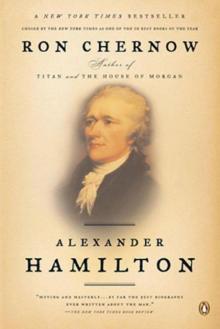 Alexander Hamilton
Alexander Hamilton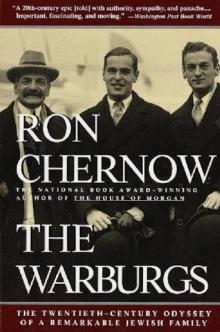 The Warburgs
The Warburgs Titan
Titan Grant
Grant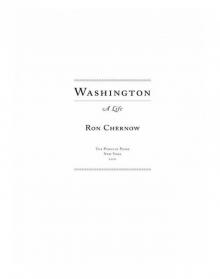 Washington
Washington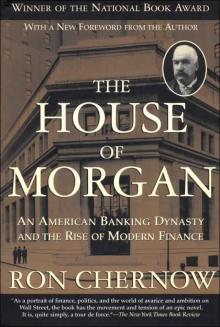 The House of Morgan
The House of Morgan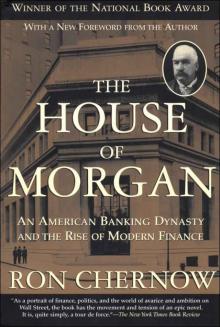 The House of Morgan: An American Banking Dynasty and the Rise of Modern Finance
The House of Morgan: An American Banking Dynasty and the Rise of Modern Finance